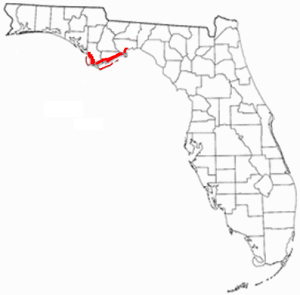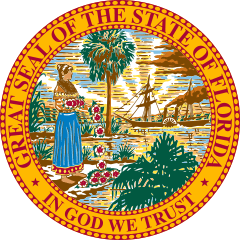Forgotten Coast
Florida's Forgotten Coast is a registered trademark, coined in the early 1990s, by the Apalachicola Bay Chamber of Commerce.[1] The name is most commonly used to refer to a relatively quiet, undeveloped and largely uninhabited section of coastline stretching from Mexico Beach on the Gulf of Mexico to St. Marks on Apalachee Bay in the U.S. state of Florida.[2] The nearest major cities are Tallahassee, about 90 miles (145 km) northeast of Apalachicola, and Panama City, home of Tyndall Air Force Base, about 60 miles (95 km) to the northwest.

In addition to the endpoints, it encompasses the coastal communities of (west to east):
- Port St. Joe
- Cape San Blas
- Apalachicola
- Eastpoint
- Carrabelle
- Lanark Village
- Alligator Point
- Panacea
- Shell Point
These communities are located in the following counties, which by extension may be included in references to the Forgotten Coast by some writers:
The area is renowned for its oyster and shrimp production, marine wildlife, and fine white-sand beaches. Peninsulas and barrier islands along the coast include:
- Gulf County:
- Franklin County:
- St. Vincent Island
- Cape St. George Island
- St. George Island
- Dog Island
Protected natural and historic areas include:
- St. Joseph Peninsula State Park
- Apalachicola National Estuarine Research Reserve
- Prospect Bluff Historic Sites
- St. Vincent National Wildlife Refuge
- St. George Island State Park
- Tate's Hell State Forest
- Bald Point State Park
- Wakulla State Forest
- Edward Ball Wakulla Springs State Park
- San Marcos de Apalache Historic State Park
- St. Marks National Wildlife Refuge
- Tallahassee-St. Marks Historic Railroad State Trail
See also
- Florida Panhandle
- Emerald Coast, to the west
- Nature Coast, to the east and south
References
- United States Patent and Trademark Office Searching on this site reveals that the name was "first used in commerce" in 1992; the ABCofC registered the trademark in 2009.
- Reiley, Laura. "The Forgotten Coast," Moon Florida Gulf Coast. Avalon Travel Publishing, 2008, pp. 262-289. ISBN 1-59880-082-5

